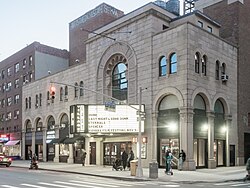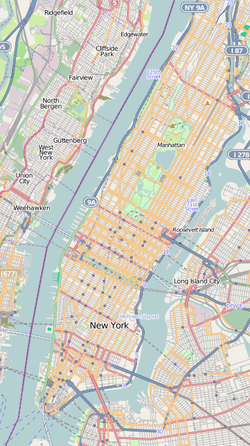 | |
 | |
| Former names | List
|
|---|---|
| Address | 181–189 Second Avenue |
| Location | East Village, Manhattan, New York City |
| Coordinates | 40°43′51″N 73°59′11″W / 40.73083°N 73.98639°W |
| Public transit | New York City Subway: |
| Owner | Senyar Holding Company |
| Operator | City Cinemas (Reading International); Angelika Film Center |
| Type | Yiddish, Off-Broadway |
| Screens | 7 |
| Current use | Movie theater |
| Construction | |
| Architect | Harrison Wiseman |
| Website | |
| www | |
Yiddish Art Theatre | |
New York City Landmark No. 1764, 1765
| |
| Location | 189 Second Avenue, New York, New York |
| Coordinates | 40°43′51″N 73°59′11″W / 40.73083°N 73.98639°W |
| Area | 12,077 sq ft (1,122.0 m2) |
| Built | 1926 |
| Architect | Harrison G. Wiseman |
| Architectural style | Moorish |
| NRHP reference No. | 85002427[1] |
| NYCL No. | 1764, 1765 |
| Significant dates | |
| Added to NRHP | September 19, 1985 |
| Designated NYCL | February 9, 1993 |
Village East by Angelika (also Village East, originally the Louis N. Jaffe Art Theatre, and formerly known by several other names[a]) is a movie theater at 189 Second Avenue, on the corner with 12th Street, in the East Village of Manhattan in New York City. Part of the former Yiddish Theatre District, the theater was designed in the Moorish Revival style by Harrison Wiseman and built from 1925 to 1926 by Louis Jaffe. In addition to Yiddish theatre, the theater has hosted off-Broadway shows, burlesque, and movies. Since 1991, it has been operated by Angelika Film Center as a seven-screen multiplex. Both the exterior and interior of the theater are New York City designated landmarks, and the theater is on the National Register of Historic Places.
Village East's main entrance is through a three-story office wing on Second Avenue, which has a facade of cast stone. The auditorium is housed in the rear along 12th Street. The first story contains storefronts and a lobby, while the second and third stories contained offices, which were converted into apartments in the 1960s. The main lobby connects to another lobby along 12th Street with a promenade behind the auditorium. The auditorium consists of a ground-level orchestra and one overhanging balcony with boxes. The balcony remains in its original condition, but the orchestra and former stage area have been divided into six screens.
The Louis N. Jaffe Art Theatre was originally used by the Yiddish Art Theatre and largely served as a Yiddish playhouse from 1926 to 1945. It opened on November 17, 1926, with The Tenth Commandment. The Yiddish Art Theatre moved out of the theater after two seasons, and it became the Yiddish Folks Theatre. The venue was leased by Molly Picon in 1930–1931 and by Misha and Lucy German in 1931–1932. The Yiddish Arts Theatre then performed at the theater until 1934, after which the Yiddish Folks continued for two more years. From 1936 to 1944, the building was a movie theater called the Century Theatre, hosting Yiddish performances during two seasons.
After a decline in Yiddish theater, the Jaffe Art Theatre was renamed the Stuyvesant Theatre in 1946 and continued as a movie theater for seven years. The then-new Phoenix Theatre used the playhouse from 1953 to 1961. The Jaffe Art Theatre then became the Casino East Theatre, which hosted the burlesque production This Was Burlesque for three years before becoming a burlesque house called the Gayety Theatre in 1965. The theater was renamed yet again in 1969, this time operating as the off-Broadway Eden Theatre until 1976, showing the revue Oh! Calcutta!. The venue was then converted into a movie theater, the 12th Street Cinema, before returning to live shows in 1977 under the name Entermedia Theatre (renamed the Second Avenue Theatre in 1985). After closing in 1988, the Jaffe Art Theatre was renovated into Village East Cinema, reopening in 1991. Angelika rebranded the theater in 2021.
- ^ "National Register Information System". National Register of Historic Places. National Park Service. November 2, 2013.
- ^ Landmarks Preservation Commission 1993, pp. 6–10.
Cite error: There are <ref group=lower-alpha> tags or {{efn}} templates on this page, but the references will not show without a {{reflist|group=lower-alpha}} template or {{notelist}} template (see the help page).



